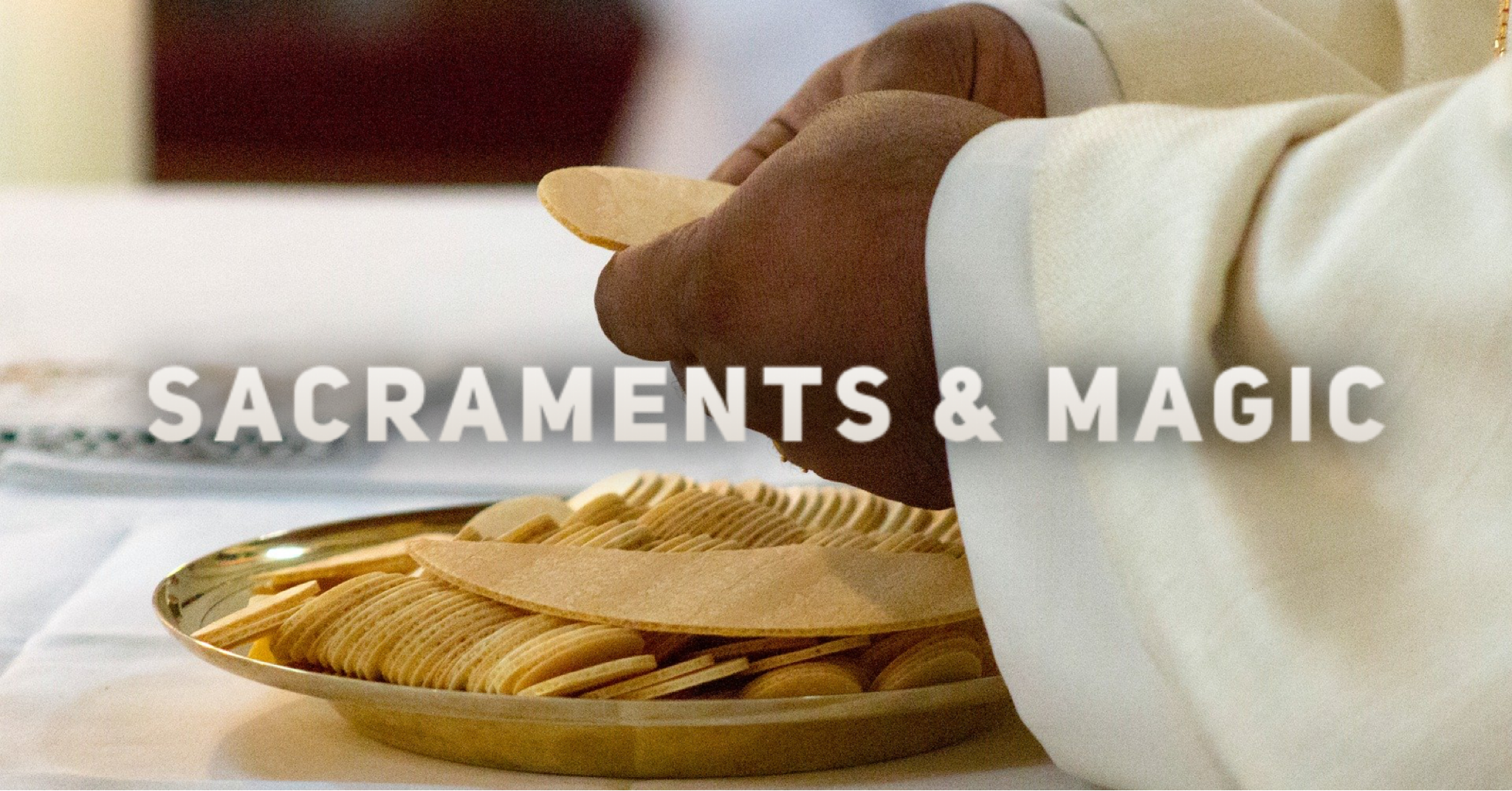Sacraments and Magic
There are no sacraments in the Bible. Sacrament is a concept foreign to the biblical world-view. It is interesting to observe that where sacramental thinking is strong, covenantal thinking is usually very weak, often non-existent. What are usually misconstrued as sacraments in Scripture are really covenant signs, not sacraments.
A sacramentum was originally a sum of money deposited with a representative of the State (one of the tresviri capitales) when a Roman citizen went to court. The party that lost his case lost his sacramentum, which was then used to defray the costs of the public works, temples and sacrifices. It was called a sacramentum either because if forfeited it was used for religious purposes or more probably because it was deposited in a sacred place (Lewis and Short). It later came to mean an oath, such as that sworn by the legionaries, but it was not restricted to legionary oaths. It subsequently came to mean a mystery, and then the church decided it would henceforth mean something it had never meant before, namely the outward sign of an inward grace.
Sacrament, in the sense that the word is used today and by the church throughout most of history, was an invention of the church to bolster up its growing ritualisation of the faith and concentration of power in the hands of a priesthood, and its development went, and still goes, hand in hand with the abandonment of covenant. The concept is alien to biblical theology. Where sacramental theology is strong covenantal theology is usually very weak.
The degree to which one accepts the whole idea of sacraments is the degree to which one fails to understand biblical covenantal theology and adopts a magical instead of a covenantal understanding of the Christian faith. It is also the degree to which Christianity is abandoned as a religion and becomes a mere mystery cult instead. Circumcision, the Passover, Baptism and the Lord’s Supper (i.e. the agape, the Christian Passover) are covenant rites,—signs and seals of the covenant—not sacraments. The concept of sacrament in the sense used by the Church is an idea foreign to Scripture. There are no sacraments in the Bible. The word was not even used in the sense that it is used today and throughout most of church history until around the third century AD (it was first used in this sense by Tertullian, c. 155–240 AD).
Fundamental to the concept of sacrament is the idea that the correct performance of ritual can produce an effect in the recipient and indeed even in the external world, so that all one needs to do to practice the faith and even reform the world is to practice the correct liturgy in the Church, and where the liturgy is deemed to be defective to reform the liturgy according to whichever sacramental theory one believes to be correct. The correct term for this kind of belief is magic. The performance of what is deemed to be correct ritual underpins all forms of magic. Belief in the power of ritual (magic) is thoroughly pagan, and yet it is this belief that structures, governs and manifests itself in the vast majority of Christian Churches today, as indeed it has done throughout the greater part of the history of the Church, and this is so for Protestant and charismatic Churches no less than traditional Episcopal Churches.
The Bible has very little to say about ritual in the Christian Church, and Jesus himself seems to have spoken and behaved in such a way that it is impossible to derive any form of ritual from his teaching or actions. In fact, the rituals of the Church in the main derive not from the Bible (although justification for ritual itself is often incorrectly derived from a mistaken understanding of the Old Testament temple sacrifices), but rather from pagan Roman religious rituals, which were stripped of their pagan content and then given a superficial Christian veneer. Belief in the power of ritual, magic, replaced the covenant. But Christianity does not work by magic.
God works through the lives of his people, through their obedience to his word (the covenant of grace), in living as the true society, the kingdom of God, which is a counter-revolutionary prophetic social order, the purpose of which is to glorify God by converting all the nations, thereby transforming the world, so that when the Lord returns, the kingdoms of this world will have become the kingdom of our Lord and of his Christ. This is about as far from what goes on in most Churches today as it is possible to get.
The Church today desperately faces the need for reformation, indeed for a reformation as great as, even greater than, the Reformation of the sixteenth century. But it is unlikely that such a reformation will ever take place while the present structures of Church authority and the official magic that supports them retain their stranglehold on the body of Christ. It seems therefore inevitable, that the precursor to such a reformation can only be a complete collapse and final discarding of those structures and the ideologies that give them meaning and life. If the house is to be rebuilt again according to the Lord’s design, the crooked foundations on which it previously stood for so long must be cleared away for good.
